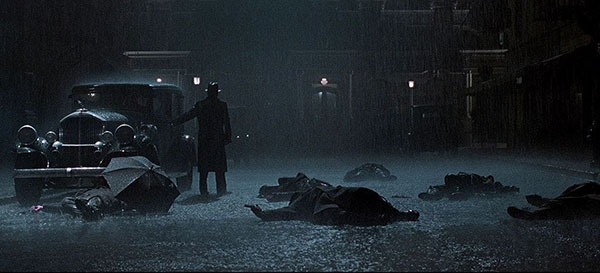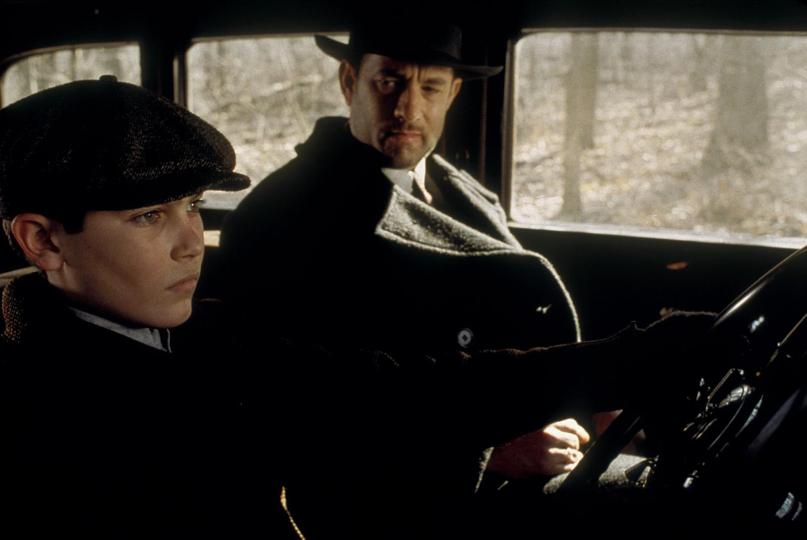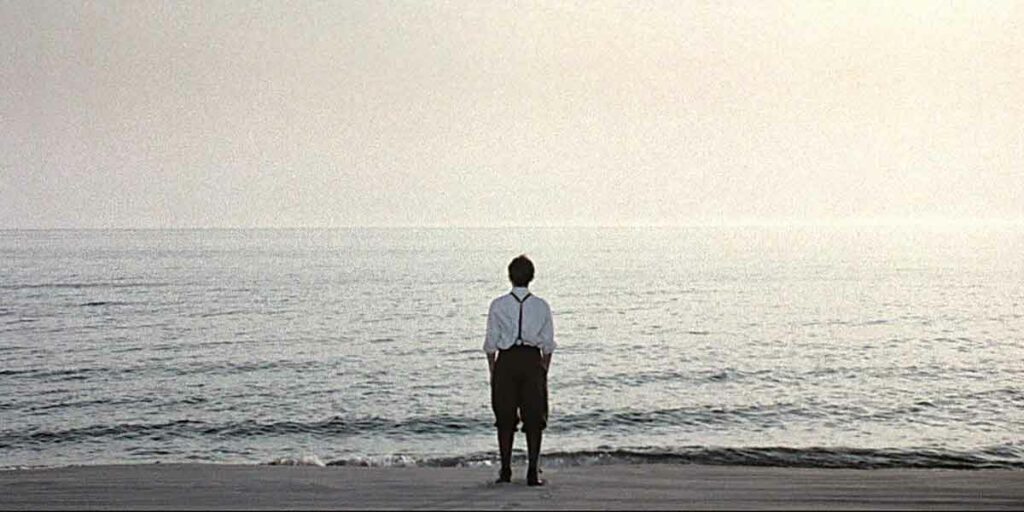The concept of morality is often presented as an active choice, but Road To Perdition asks: what if we have no control over our own moral standing?
This article contains spoilers for ‘Road To Perdition’.
“When people ask me if Michael Sullivan was a good man, or if there was just no good in him at all, I always give the same answer. I just tell them… he was my father.”
Michael Sullivan (Tom Hanks) is a hitman: an employee of a dangerous mobster who’s hired to take out his enemies and dispose of them whenever they pose a threat to the company. It should seem obvious that he’s not a good man. And yet, throughout Road to Perdition, the movie reflects heavily on Sullivan’s morality and the reasons behind his evident sins, making us question what really makes a good man after all. He performs countless acts of violence and brutality throughout the story, tracking down his old friend Connor (Daniel Craig) after finding his wife and child murdered by his hand. This fruitless game of cat-and-mouse leads Sullivan to his inevitable destiny at the hands of Maguire (Jude Law), another hitman instructed by the company to kill him.
In Sullivan’s final moments, seconds after being fatally wounded by Maguire, he sees his eldest son Michael Jr (Tyler Hoechlin) holding a gun to his father’s killer. The moment almost plays out in slow motion, with both Sullivan and Michael Jr. weighing the consequences of their actions before Sullivan eventually kills Maguire before his son even has a chance.
The final scene of Road to Perdition has been discussed extensively, torn apart and reframed by many skilled thinkers regarding its stance on morality and violence, with the primary reading looking something like this: by shooting Maguire in those closing moments, Sullivan is preventing his son from doing it himself and tarnishing his own soul. The murder was an entirely selfless act, done without any semblance of revenge or vindication, simply to stop Michael Jr. from becoming the needlessly violent man that Sullivan now recognizes himself as. However, buried in this thesis is a much more potent implication that reveals the movie’s true message and real concerns: if Sullivan hadn’t intervened, Michael Jr would have killed Maguire himself and become everything that his father tried to prevent. Does this intention alone make him as bad as his father?

Road to Perdition talks exhaustively about the idea of cause and effect, about actions having consequences that can often spiral out of control. When Michael Jr’s decides to follow his father to work at the beginning of the film and witnesses him kill a family friend, this causes Connor to murder Sullivan’s family. In turn, this leads Sullivan to murder Connor, which causes Maguire to kill Sullivan, which almost causes Michael Jr to avenge his father and murder Maguire. But this is where the chain ends. The endless string of murders is ultimately ended by Michael Jr when he breaks the chain, which really pushes home the idea of everything being a consequence of something else.
These two ideas – Michael Jr’s almost-murder of Maguire and the movie’s exploration of cause and effect – finally culminate in that final scene and leave the audience with a horrific realization that’s even darker than it seems on the surface. For his whole life, Sullivan (and therefore the audience) has believed that his life of sin was a choice, a consequence of his active decision to survive by any means necessary – but in his final moments, seeing the same corruption and darkness in his son, he’s confronted with the realization that maybe people are just born sinful. Maybe we’re lying to ourselves by suggesting that we have control over our morality. Maybe sin is the one thing left unbound by the law of cause and effect.
“Just as sin entered the world through one man, and death through sin, and in this way death came to all people, because all sinned…” (Romans, 5:12-21)
The concept of original sin is a hugely influential doctrine in Christian theology, which essentially states that all humans are born with corrupted souls and have no free will toward purely good acts. While most Christian thinkers consider original sin to be a consequence of Adam’s transgressions in the Garden of Eden, Road to Perdition seems less interested in what caused this natural tendency for evil and more concerned with how (if at all) it can be overcome. Sullivan attempts to purify his son’s soul by killing Maguire himself, knowing that he’s already beyond redemption – but does this really work?
Sam Mendes’ astute direction really shines in this scene, and by flicking sharply between close-ups of Sullivan and Michael Jr, he makes it very clear what both characters are feeling and experiencing in these brief moments. Sullivan initially sees a future where his son doesn’t shoot Maguire, and he knows that in this reality, Michael Jr will be spared from both corruption and death. It’s not until Sullivan actually sees the intent behind his son’s eyes that he picks up the gun and kills Maguire himself. He saw his son’s transformation from child to sinner – his murder of Maguire was just a futile attempt to stop it.

“But each person is tempted when he is lured and enticed by his own desire. Then desire when it has conceived gives birth to sin, and sin when it has fully grown brings forth death.” (James, 1:14-15)
In Road to Perdition’s case, that ‘desire’ is violence itself. A seductive act that’s framed through a wide cast of violent gangsters as the solution to all their problems; it’s through violence that Rooney (Paul Newman) became rich, through violence that Connor protected himself for so long, and through violence again that Sullivan avenged his family’s deaths. It’s the one constant in these men’s lives, tearing them apart from the inside and selling their souls for profit. Michael Jr is the one character whose actions and beliefs aren’t dripping with violence at every opportunity, yet he’s still unable to avoid his transgression into sin at the end of the story.
Sullivan falsely believes until his dying moments that evil is a choice. He kills Maguire to prevent his son from making this choice, but he completely misses the point that his son was always going to enter a world of sin thanks to the world that he’s been raised in. Violence brings nothing but violence, and this toxic cirlce of masculinity is a breeding ground for exactly that. Sullivan’s decision to spare Michael Jr’s soul was an illusion, rooted in the fallacy that evil is developed instead of created. Even though Michael Jr claims in his final monologue to never have held a gun again, the sin that was born in that moment is something that may never leave, and the sin that Sullivan carried through this world will be reborn in his grandchildren. It could never have been any other way.
Road To Perdition is now available to watch on digital and on demand.

